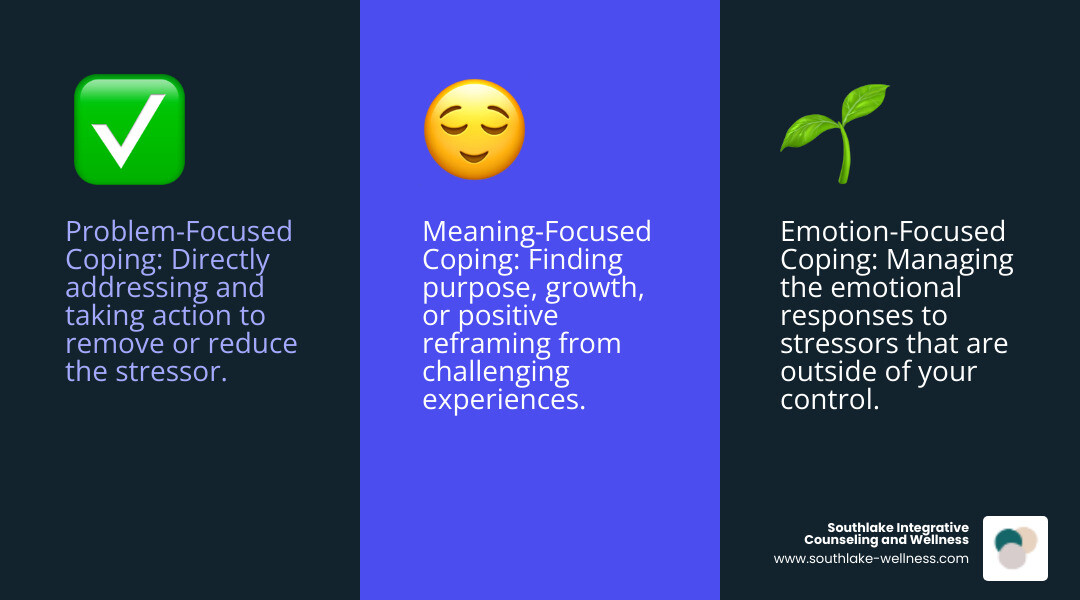
Why Holistic Coping Strategies Matter for Your Mental Well-Being
Holistic coping strategies are comprehensive approaches that address your mind, body, and spirit to help you manage life's challenges. When overwhelmed by stress, these strategies offer a complete toolkit for emotional balance and resilience.
Quick Overview of Holistic Coping Strategies:
- Mind-based approaches: Mindfulness, meditation, deep breathing, cognitive reframing
- Body-based strategies: Exercise, yoga, healthy eating, sleep hygiene, progressive muscle relaxation
- Heart-centered methods: Journaling, creative expression, gratitude practice, social connection
- Proactive planning: Building resilience, identifying triggers, developing personalized coping toolkits
Everyone feels overwhelmed at times. Whether it's a looming deadline, a difficult conversation, or an unexpected life change, these moments can leave you feeling distressed. The challenge becomes greater when your brain is on high alert. When you're emotionally activated, the rational part of your brain can go offline, making it hard to think clearly or solve problems.
This is where a personalized set of positive coping skills becomes essential. Instead of relying on unhealthy habits, holistic strategies help you address stress from multiple angles. They activate your body's relaxation response, release mood-boosting endorphins, and provide practical tools for both immediate and long-term stressors.
I'm Holly Gedwed, a Licensed Professional Counselor Associate with 14 years of clinical experience in trauma, addiction, and anxiety. In my practice, I've seen how holistic coping strategies that combine evidence-based therapies with mind-body approaches create lasting change.

Why Your Brain Freezes: Understanding Overwhelm and the Need for Coping
Ever notice how your mind goes blank when you need it most? When facing a threat (even a stressful email), your brain activates the fight-flight-freeze response. This ancient protection system isn't a personal failing, but it can feel like your brain is on high alert and useless at the same time.
The Science of Stress
During overwhelming moments, your amygdala (the brain's smoke detector) triggers an amygdala hijack, putting your emotional center in charge. Your prefrontal cortex, the rational part of your brain, goes offline. This emotional activation floods your body with stress hormones like cortisol, causing a racing heart, shallow breathing, and difficulty thinking clearly. This response was useful for our ancestors but is less helpful for modern stressors.
The good news is you can activate your parasympathetic nervous system, the body's "rest and digest" mode. Simple techniques like deep breathing release endorphins and bring your rational brain back online. You can learn more about our approaches to managing these intense stress responses.
The Importance of a Holistic Approach
Stress affects your thoughts, body, and emotions. A holistic approach addresses all these areas, recognizing the powerful mind-body-spirit connection. When you're stressed, your body tenses, your thoughts spiral, and you can feel disconnected.
True emotional balance and resilience come from addressing these interconnected pieces. Instead of putting a band-aid on symptoms, holistic coping strategies help you build lasting overall well-being. You're not just surviving overwhelming moments—you're getting stronger.

The Five Styles of Coping: Finding Your Approach
We all have natural ways of responding to stress. Understanding these coping styles helps you choose the most effective approach. Psychologists distinguish between adaptive strategies (which help) and maladaptive strategies (which offer temporary relief but cause long-term problems). The key is knowing which style fits the situation.
FeatureProblem-Focused CopingEmotion-Focused CopingGoalChange the situation or remove the stressorManage feelings about the situationWhen to UseWhen you have control over the situationWhen you have little or no control over the situationApproachAction-oriented, planning, direct interventionInternal, reflective, emotional regulation, distractionExamplesTime management, problem-solving, seeking adviceJournaling, meditation, exercise, seeking emotional support
Problem-Focused Coping
This style is about taking control and finding actionable solutions. It works best when you can change the situation, such as removing stressors within your control. For example, if a project is overwhelming, you could use time management to break it down into smaller tasks or improve your schedule. Asking for help by delegating tasks or seeking advice is also a powerful problem-focused strategy.
Emotion-Focused Coping
When you can't change the situation, emotion-focused coping helps you manage your feelings. This approach is about managing feelings rather than fixing the unfixable. Techniques include self-soothing (like taking a warm bath), healthy distraction (like listening to music), and acceptance. Acknowledging what is out of your hands can free up significant emotional energy. Mind-body approaches like Mind-Body Harmony Massage Therapy can be very effective for emotional regulation.
Meaning-Focused Coping
For profound challenges, meaning-focused coping helps you make sense of it all by finding purpose. This can involve cognitive reframing—for instance, seeing a job loss as an opportunity for a new path. It's about finding genuine growth in difficult experiences. Gratitude, positive thinking, and spiritual practice can also help shift your perspective and find comfort.
Social Coping
Humans are wired for connection. Social coping means seeking support and not facing challenges alone. Connecting with others provides practical help and emotional comfort. This can be as simple as sharing burdens with a friend or building community through support groups or shared hobbies. Even active listening with someone else can remind you that you're not alone.
Avoidance-Focused Coping
Sometimes, a temporary distraction is a healthy way to regroup. Healthy avoidance is a strategic pause, like taking a short walk to clear your head before tackling a problem. Unhealthy avoidance, however, involves procrastination or isolation that makes stress worse. Be honest with yourself: are you taking a brief break to recharge, or are you avoiding something that needs your attention?

Your Toolbox of Holistic Coping Strategies
Building a personalized toolbox of holistic coping strategies means you'll be better prepared for life's challenges. The key is to experiment and find what resonates with your personality and lifestyle. Some people prefer movement, others stillness; some need creative outlets, others social connection.
Mind-Based Holistic Coping Strategies for Calm and Clarity
When your thoughts are racing, these strategies help guide your brain to a calmer state.
- Mindfulness and meditation: These well-researched tools involve staying present without judgment. Scientific research shows that meditation can reduce stress and anxiety. You can practice mindfulness anywhere, like while washing dishes or walking.
- Deep breathing exercises: This is one of the fastest ways to calm your nervous system. Try the 4-7-8 technique: inhale for 4 counts, hold for 7, and exhale for 8.
- Grounding techniques: When you feel disconnected, the 5-4-3-2-1 method brings you back to the present. Name 5 things you see, 4 you hear, 3 you feel, 2 you smell, and 1 you taste.
- Cognitive reframing: Gently shift unhelpful thought patterns. Instead of "I'm terrible at this," try "I'm still learning." It's about finding a more balanced perspective.
- Positive affirmations: Create authentic statements that reflect your goals, like "I am learning to trust myself."
Body-Based Strategies for Physical Release
Your body holds stress physically. These strategies help release tension and boost your mood.
- Physical activity: Moving your body releases endorphins, your brain's feel-good chemicals. A brisk walk, dancing, or a few jumping jacks can make a difference.
- Yoga: This practice combines movement with mindful breathing to connect your mind and body, releasing physical tension.
- Healthy eating: The gut-brain axis means your diet impacts your mood. Focus on whole foods and hydration to improve emotional stability.
- Sleep hygiene: Quality sleep is foundational for handling stress. Aim for 7-9 hours per night and create a calming bedtime routine, avoiding screens before bed.
- Progressive muscle relaxation: Tense and then release different muscle groups, from your toes to your head, to become aware of and release physical tension.
For more on integrating these practices, explore Mind-Body Physical Therapy and Wellness.
Heart-Centered and Creative Strategies
Process stress through creativity and emotional connection.
- Journaling: Putting thoughts and feelings on paper can help you process emotions and gain insight. Just let your thoughts flow without judgment.
- Creative expression: Art, music, or crafting can release emotions that are hard to verbalize. The healing is in the process, not the product.
- Music: Create playlists to shift your mood—upbeat for energy, calm for relaxation.
- Hobbies: Engaging in activities you love, like gardening or reading, can create a "flow state," providing a healthy escape from stress.
- Gratitude practice: Train your brain to notice the good. Each day, note three things you're grateful for.
- Self-compassion: Treat yourself with the same kindness you'd show a friend. Instead of self-criticism, practice gentle understanding.

From Reactive to Proactive: Long-Term Coping and What to Avoid
Building holistic coping strategies is about creating long-term resilience. Practicing healthy skills when you're calm builds emotional muscle memory, making them more accessible when you're overwhelmed. This means shifting from reacting to crises to proactively preparing for challenges.
Unhealthy Coping Mechanisms to Avoid
Quick fixes often feel good in the moment but create bigger problems later. Be mindful of these patterns:
- Substance use: Using alcohol or drugs to escape can lead to dependency and more stress.
- Emotional eating: Soothing feelings with food often leads to guilt and avoids the real issue.
- Oversleeping: Using sleep to avoid life can increase anxiety and depression.
- Isolation: Pulling away cuts you off from supportive connections that aid healing.
- Overthinking and rumination: Getting stuck in worry loops increases anxiety without finding solutions.
- Procrastination: Delaying tasks only amplifies stress as deadlines approach.
Developing Proactive Holistic Coping Strategies
Proactive coping means building your resilience toolkit before you need it. Here's how:
- Identify your personal triggers: Notice what situations, conversations, or times of year consistently cause stress. Knowing your patterns allows you to prepare.
- Plan ahead for predictable stressors: If you know the holidays are overwhelming, start practicing stress-reduction techniques in advance.
- Experiment with different strategies: Find what truly works for you. Some people need movement, while others prefer quiet reflection.
- Practice regularly: Consistent practice turns coping strategies into reliable tools.
In a stressful moment, ask yourself: Is this controllable? What has helped before? Do I need an active or a gentle approach? This helps you choose the right tool for the job.
For a comprehensive approach to building these skills, explore our Integrative Therapy Guide to see how different therapeutic modalities can support your journey.
Frequently Asked Questions about Coping
Here are answers to common questions about exploring holistic coping strategies.
What are the "4 A's of coping"?
The "4 A's" offer a simple framework for handling stress:
- Avoid: Step away from unnecessary stressors. Learn to say no to things that drain your energy.
- Alter: Change the situation. If your commute is stressful, try a different route or listen to a calming podcast.
- Adapt: Change your perspective. Reframe a challenge as a learning opportunity.
- Accept: Acknowledge what is beyond your control. This can be difficult but is often the most freeing option.
How do I know which coping strategy is best for my situation?
Choosing the right strategy involves assessing the stressor and your current state.
- Is the situation controllable or uncontrollable? If it's controllable, use problem-focused strategies. If not, use emotion-focused ones.
- What is your current state? If you're highly overwhelmed, choose a simple technique like deep breathing. If you're calmer, you might have the energy for problem-solving.
- What is your personal preference? Pay attention to what genuinely helps you feel better, whether it's movement, reflection, or creativity.
- Experiment. Try different strategies and notice what helps you feel more grounded.
How can I practice setting healthy boundaries?
Setting healthy boundaries is a crucial form of self-care that protects your emotional energy. It allows you to be more present for the people and activities that matter most.
- Identify your limits: Notice when you feel resentful or exhausted. These feelings often signal a crossed boundary.
- Communicate clearly and kindly: Be firm but polite. For example, "I'd love to help, but I can't take on new commitments right now."
- Practice saying no: Start with low-stakes situations to build your confidence.
- Be consistent: Consistency helps others learn to respect your limits and builds your self-trust.
For more guidance on managing stress, explore our Holistic Stress Management Techniques.
Conclusion: Embracing a More Balanced, Resilient You
How we respond to life's challenges makes all the difference. You now have a toolkit of holistic coping strategies that address your whole self—mind, body, and spirit. When your mind races, you can use grounding techniques. When your body is tense, you can turn to movement. When your heart needs tending, you can connect with others or express yourself creatively.
Coping is a learned skill. It gets easier with practice. The goal isn't to eliminate stress but to build the resilience to steer life's ups and downs with greater emotional balance. A holistic approach helps you nurture your entire being, moving from simply reacting to stress to proactively building a more fulfilling life.
Sometimes, we all need extra support. If you feel consistently overwhelmed or struggle to use these skills, you don't have to face it alone. Professional support can provide personalized guidance.
At Southlake Integrative Counseling and Wellness, we understand that true healing addresses all parts of you. We combine evidence-based therapies with holistic methods to help you develop skills for lasting mental well-being. Seeking help is one of the most powerful coping strategies there is.
Find support with individual therapy in Southlake, TX and take the next step toward becoming the balanced, resilient person you're meant to be.